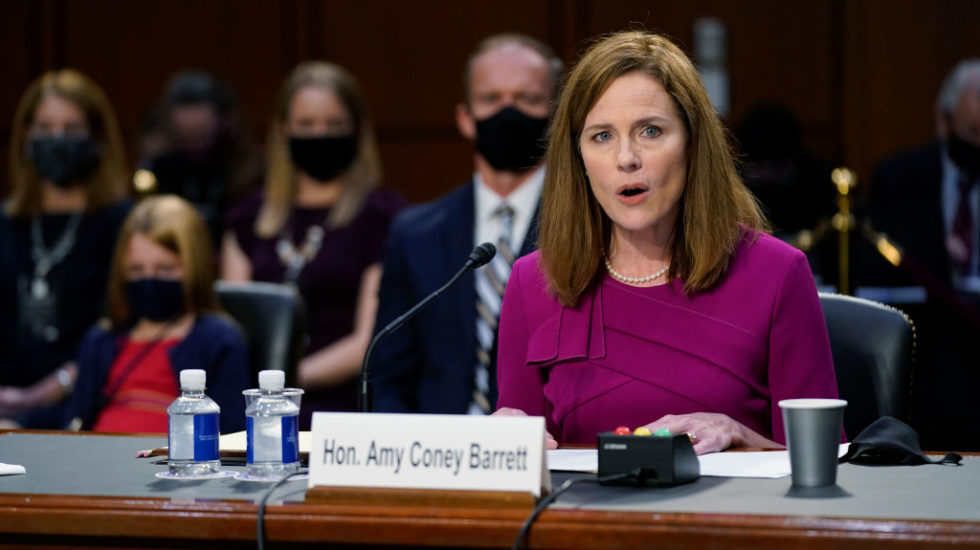Judge Amy Coney Barrett began inching her way through a labyrinth of lawmakers in the U.S. Senate on Monday, seeking confirmation as an associate justice of the Supreme Court.
The confirmation process for an avowedly conservative judge who could tilt the political balance of the court for generations was certain to be combative; the fact that it began just three weeks and one day before the 2020 election made it unique.
Politico described it as an “expertly bland” 4-page document that “did not mention her religion, her conservative credentials or what her nomination meant for the balance of the Supreme Court.”
Barrett acknowledged the importance of family in her life, as well as that of the late Justice Antonin Scalia, a mentor for whom she clerked in the late 1990s and a strong influence on her conservative legal views.
“There is a tendency in our profession to treat the practice of law as all-consuming, while losing sight of everything else. But that makes for a shallow and unfulfilling life,” she said.
“I worked hard as a lawyer and a professor; I owed that to my clients, my students, and myself. But I never let the law define my identity or crowd out the rest of my life.”
When it comes to the courts, she said, a similar principle applies.
“Courts have a vital responsibility to enforce the rule of law, which is critical to a free society. But courts are not designed to solve every problem or right every wrong in our public life,” Barrett said.
“The policy decisions and value judgments of government must be made by the political branches elected by and accountable to the People. The public should not expect courts to do so, and courts should not try.”
With a nod to the late Ruth Bader Ginsburg, a dedicated liberal whose seat on the high court she is seeking, Barrett said: “no one will ever take her place. I will be forever grateful for the path she marked and the life she led.”
But if confirmed, she said, “I might bring a few new perspectives to the bench.”
Monday was the first of four days of what are certain to be aggressive questions to Barrett, assertions, legal and otherwise, by rival Republican and Democratic senators, and resulting counter-arguments — all leading to more questions.
Some of those questions, inevitably, will be about health care and abortion.
A devout Roman Catholic at home in the “charismatic” branch of the faith, Barrett has in the past questioned the constitutionality of Roe v. Wade, the 1973 high court ruling that legalized abortion nationwide, on the grounds that a pregnant woman should have control over her own body.
“From her formative years in Louisiana to her current life in Indiana, Judge Barrett has been shaped by an especially insular religious community, the People of Praise … and draws on the ecstatic traditions of charismatic Christianity, like speaking in tongues,” says the New York Times.
“The group has a strict view of human sexuality that embraces once-traditional gender roles, such as recognizing the husband as the head of the family. The Barretts, however, describe their marriage as a partnership.”
As for health care, Sen. Sheldon Whitehouse (D-RI) called Barrett a “judicial torpedo” aimed at the Affordable Care Act (Obamacare), which has been under conservative attack for years.
The GOP is determined to push her nomination through as quickly as possible; the Democrats, knowing they’re out-voted in the current Senate, will try to stymie the process for as long as they can.
Closing her statement, Barrett thanked “the many Americans from all walks of life who have reached out with messages of support over the course of my nomination. I believe in the power of prayer, and it has been uplifting to hear that so many people are praying for me. I look forward to answering the Committee’s questions over the coming days.”
She’ll have plenty of to answer: each senator on the Judiciary Committee will get a half-hour to question her on Tuesday and Wednesday, then another 20 minutes each on Thursday; both sessions are likely to last well into the evening.



